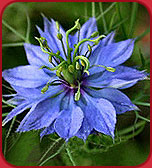 Today’s Science Daily (http://tinyurl.com/42pofz) has an interesting report on Nigella sativa, also known as black cumin. The black cumin seed plant is a member of the buttercup family and is a highly regarded medicinal plant in Asia, the Middle East and Africa.
Today’s Science Daily (http://tinyurl.com/42pofz) has an interesting report on Nigella sativa, also known as black cumin. The black cumin seed plant is a member of the buttercup family and is a highly regarded medicinal plant in Asia, the Middle East and Africa.
This is not news to me. I wrote a post in September of 2007 about Nigella sativa titled “A cure for every disease except death.” If you need a memory refresher, just click on my black cumin page on the right side of your screen.
Back to Science Daily. Researchers at Thomas Jefferson University recently discovered that an extract of Nigella sativa, called thymoquinone, blocked pancreatic cancer cell growth and killed the cells via apoptosis.
After adding thymoquinone to pancreatic cancer cells, the researchers observed increased levels of p53 and Bax, both cancer cell killers, as well as decreased levels of Bcl-2, a protein that instead blocks apoptosis. For more technical details please go read the article.
So even though I am working on a different topic right now, this article motivated me to have a quick look around to see what else I could find.
An interesting abstract published in 2006 (see: http://tinyurl.com/4srow5) deals with the effects of Nigella sativa on rats who had been injected with cadmium. Well, the rats that were treated also with Nigella sativa fared much better than the others: their red and white blood cell counts and haemoglobin were higher, for instance. This is actually the real reason I decided to mention this study: if your haemoglobin and red and white blood cell counts are low, you might consider taking this supplement. Nigella sativa also increased the lowered insulin levels and neutrophils of the rats, and decreased their elevated heart rate and glucose concentration. So, good stuff!
Since Sherlock and I have been doing our experiments together, I have stopped taking Nigella sativa. But I will resume taking it over the summer as soon as our current experiment ends. My RBC and WBC counts are low, albeit still within the normal range. My haemoglobin is also within the normal range but I would love to bring it up a bit.
Hmmm, I just read that black cumin seeds are a good source of iron, as you can see here: http://tinyurl.com/3vvs5m. Well, well…WELL!
 Today’s Science Daily (http://tinyurl.com/42pofz) has an interesting report on Nigella sativa, also known as black cumin. The black cumin seed plant is a member of the buttercup family and is a highly regarded medicinal plant in Asia, the Middle East and Africa.
Today’s Science Daily (http://tinyurl.com/42pofz) has an interesting report on Nigella sativa, also known as black cumin. The black cumin seed plant is a member of the buttercup family and is a highly regarded medicinal plant in Asia, the Middle East and Africa.